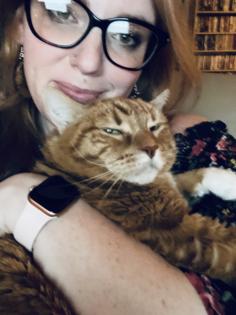Commentary: Grieving a beloved animal companion? You're not alone--and it's perfectly healthy
Published in Op Eds
My cat, Thorwald, was my constant companion for 11 years. We bonded instantly at the shelter where I adopted him, and from that moment on, he was always there: greeting me at the door, curling up in my lap, sending me into fits of laughter with his hilariously expressive meows and sleeping beside me each night. He was a steady presence through college, career changes, relationships and both joy and sorrow. Saying goodbye meant losing a close family member.
But not everyone understood.
Compounding my aching sense of loss was the seeming dismissal of it by people who remarked, “At least it wasn’t a person,” or “You can get another cat.” Perhaps they meant their words to be comforting, but it felt as though my closest companion of over a decade was being reduced to something replaceable. I started to question whether the deep void I felt was “normal.” Combing through grief resources and forums, I was struck by how many people had experienced similar invalidation. Many admitted to downplaying their pain or suffering in silence, fearing ridicule and rejection.
Why do some people struggle to empathize with the loss of an animal? I realized that often, it’s because they’ve never known that kind of bond. Animals offer us unconditional friendship, acceptance, loyalty and support through many phases of life. Someone who has never experienced that connection may not grasp its depth. Others may engage in speciesism, devaluing animals’ lives and placing them on a lower tier in some human-constructed, arbitrary ranking system. That mentality ignores that other species are imbued with the ability to love, trust, form attachments and feel joy and gratitude. Their lives are valuable, and their impact is lasting.
Eventually, I understood that my mourning wasn’t an overreaction or a sign of weakness. It was a natural response to a profound loss. “Grief is love with nowhere to go” became my healing mantra. I also came to accept that there’s no “right” way to go through the process. No checklist, no order, no timeline. Sadness, anger, guilt — they’re all OK. And while we never fully “get over” a loved one’s passing, many people find comfort in honoring their companions in meaningful ways.
Unlike when we lose a human, few social rituals exist to help us memorialize animal family members. But creating them can be healing. I dedicated a small table to Thorwald adorned with photos and Bible verses affirming that all animals have souls and a place in heaven. Other guardians have created online memorials, invited friends and family to share favorite memories during burial, written letters to those they’ve lost, planted trees or shrubs, or made donations in their animals’ honor. I’m fortunate to work for an organization that recognizes this grief and offers bereavement leave, but no one should feel ashamed to take time to heal.
There is even a holiday dedicated to honoring animals who’ve passed on. National Pet Memorial Day, observed on the second Sunday in September, was established as a way to commemorate our best friends and the contributions they made to our lives.
If you’re grieving, know this: The bond you shared was real. Your sorrow is valid. And your love is worthy of remembrance.
____
Sarah McFarlane is the creator of the Companion Animal Grief Program and the faith outreach coordinator for PETA LAMBS, the Faith Outreach Division of PETA, 501 Front St., Norfolk, VA 23510; LAMBS.PETA.org.
___
©2025 Tribune Content Agency, LLC.
























































Comments